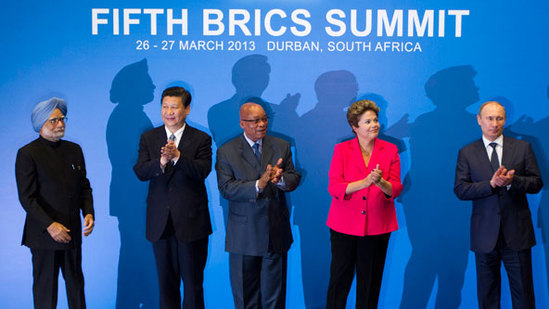What did the Washington Consensus look like in practice? And how have the
BRICS appropriated, adopted, adapted or abandoned specific aspects of this transnational policy paradigm? What does this mean for the future of global economic order? Cornel Ban and Mark Blyth have organized an interesting special edition addressing these quesitons in the Review of International Political Economy.
The authors point out that although the BRICS “went through their impressive growth spurts in an international context dominated by neoliberal economic ideas and narratives about the dos and don’ts of development, they nevertheless reclaimed the role of the state in development far beyond the limits of the Washington Consensus framework.”
The BRICS’ relationship with the Washington Consensus ocurred, over the past decade, in an international political and economic environment largely deprived of the Bretton Woods’ main tool of this transnational policy paradigm: international policy conditionality. While several BRICS have vivid memories of being subjected to policy conditionalities, their recent rise has been marked by their capacity to evade such rules and act independently – and a lot of domestic political pressure to do things differently.
The result, the authors make clear, was a proliferation of institutional and ideational hybrids that bore the imprint of distinctive ‘edits’ of the original Washington Consensus to make them compatible with the domestic context. Yet they righty conclude that none of these modifications amount to a “countermodel” or an attempt to undermine global economic order.
India and Brazil, for example, institutionalized a hybrid form of economic governance that lies between the Washington Consensus policy paradigm and domestic institutional imperatives. While China exhibits several forms of state intervention in the economy that give Chinese capitalism a distinctly non-Washington Consensus flavor, these local adaptations do not necessarily amount to the antithesis of, or an alternative to, the Washington Consensus. It makes therefore little sense to speak of a coherent Beijing Consensus that can challenge the notions embodied in the Washington Consensus. This is particularly important for policy makers across the developing world who seek to copy the Chinese model in the hope of discarding the Washington Consensus entirely.
I have argued before that “the creation of the BRICS Development Bank may be seen as the beginning of a BRICS Consensus – symbolized by the pursuit of a state-led economic growth strategy sustained by strong development banks.” This special edition puts that sweeping assessment into question. Rather than rejecting the Washington Consensus, the BRICS seem to have transformed it.
Read also:
Institutionalizing South – South Cooperation: Towards a New Paradigm?
China Development Bank: A model for the BRICS Bank?
Could the BRICS provide loans without conditionalities?
Photo credit: Rogan Ward/Reuters









